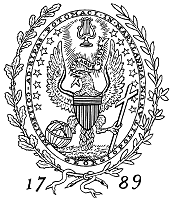Healy Hall
|
Healy Hall | |
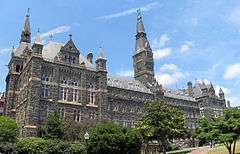 | |
 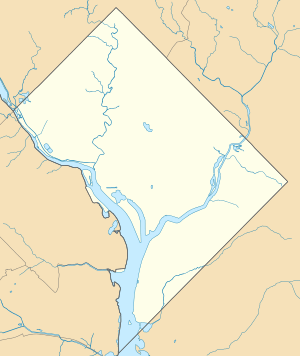  | |
| Location | Georgetown University, Washington, D.C. |
|---|---|
| Coordinates | 38°54′26.07″N 77°4′22.73″W / 38.9072417°N 77.0729806°WCoordinates: 38°54′26.07″N 77°4′22.73″W / 38.9072417°N 77.0729806°W |
| Built | 1877-79 |
| Architect | Smithmeyer and Pelz |
| Architectural style | Neo-Medieval |
| NRHP Reference # | 71001003 |
| Significant dates | |
| Added to NRHP | May 25, 1971[1] |
| Designated NHL | December 23, 1987[2] |
Healy Hall is the historic flagship building at the main campus of Georgetown University. Constructed between 1877-79, it was designed by prominent architects Paul J. Pelz and John L. Smithmeyer at the time they were working on the Library of Congress. The building was listed on DC Inventory of Historic Sites in 1964, on the National Register of Historic Places on May 25, 1971, and as a National Historic Landmark on December 23, 1987. Healy Hall was named after the then President of Georgetown University, Patrick Francis Healy.
History
The building was built during the presidency of Patrick Francis Healy after whom it is named.
The construction of the building, from 1877 to 1879, dramatically increased the amount of classroom and living space - at the time it was also used as a dormitory - of what was then a small liberal arts college. The construction also left the university deeply in debt and in possession for years of an enormous pile of dirt as a result of the excavation, with no funds to remove it. As a result of the debts, the Gaston Hall auditorium could not be completed until 1909.
The building was brought to national attention in 1973 when it acted as a prominent background for the film The Exorcist. In 1990 the interior hall and also the second story of the building featured in The Exorcist III.
Architecture
Built in a Neo-Medieval style that combines elements of Romanesque, Early Gothic, Late Gothic and Early Renaissance, the building contains the Office of the President; Georgetown's Department of Classics; the Kennedy Institute of Ethics; and the Bioethics Research Library.
Notable rooms in Healy include Riggs Library, one of the few extant cast iron libraries in the nation; the Philodemic Room, the meeting room for the Philodemic Society, one of the oldest collegiate debating clubs in the nation; the grand Hall of Cardinals; the historic Constitution Room; and the Carroll Parlor, which houses several notable pieces from the university's art collection.
Perhaps the grandest space in the building is Gaston Hall, Georgetown's "Jewel in the Crown",[3] the 750-seat auditorium which has played host to multitudes of world leaders. Gaston Hall, located on the third and fourth floors and named for Georgetown's first student, William Gaston, is decorated with the coats of arms of the Jesuit colleges and universities and rich allegorical scenes painted by notable Jesuit artist Brother Francis C. Schroen. Schroen also created the intricate paintings found in the Carroll Parlor and on the ceiling of the Bioethics Reference Center's Hirst Reading Room.
Clock hands

The hands of the Healy Clock Tower have been subjected to many thefts, as per the university tradition.[4] Historically, students would steal the hands and mail them to the person they wished to visit the campus, most notably sent to the Vatican, where they were blessed by Pope John Paul II and then returned to the university.[5][6] One such incident caused significant damage to the clock mechanism, however, and security has been increased as a result in recent years, decreasing the incidence of the theft.[7] These measures have not prevented students from successfully obtaining the hands however, as they are captured every five to six years, such as in the fall of 2005 by Drew Hamblen (SFS ’07) and Wyatt Gjullin (COL ’09).[8] The hands were stolen once again during the evening between April 29 and April 30, 2012, and supposedly sent to Barack Obama but the hands ended up lost in the mail.[9] Most recently, the clock hands were stolen during the evening between December 9th and December 10th, 2014.[10]
Image gallery
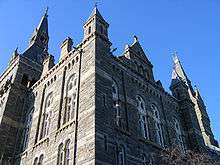 South side of Healy Hall
South side of Healy Hall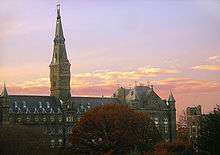 Healy at Sunset
Healy at Sunset- Healy from the main entrance
- Gaston Hall
 Healy among other spires
Healy among other spires The Philodemic Society Room in 1910
The Philodemic Society Room in 1910 Healy Hall in 1904
Healy Hall in 1904
See also
- Patrick Francis Healy
- Paul J. Pelz
- John L. Smithmeyer
- Gaston Hall
- Riggs Library
- List of tallest buildings in Washington, D.C.
References
| Wikimedia Commons has media related to Healy Hall. |
- ↑ National Park Service (2007-01-23). "National Register Information System". National Register of Historic Places. National Park Service.
- ↑ Listing at the National Park Service
- ↑ Georgetown's Jewel in the Crown
- ↑ Heberle, Robert (2005-09-27). "Healy Clock Hands Stolen Over Weekend". The Hoya. Retrieved 2007-03-28.
- ↑ Heberle, Robert (2005-10-07). "Pilfering A GU Landmark". The Hoya. Retrieved 2007-03-28.
- ↑ Sheridan, Patrick (2006-01-31). "Healy Duo Receives One Year Probation". The Hoya. Retrieved 2007-03-28.
- ↑ Balz, Chrissy A. (2005-11-08). "Healy Clock Theft Has Roots in GU History". The Hoya. Retrieved 2007-03-28.
- ↑ Heberle, Robert (2005-10-14). "Students Confess In Clock Case". The Hoya. Retrieved 2007-03-28.
- ↑ Hinchliffe, Emma (2012-05-17). "Clock Hands Tradition Rekindled". The Hoya. Retrieved 2014-06-25.
- ↑ http://blog.georgetownvoice.com/2014/12/10/gupd-confirms-the-healy-clock-hands-were-stolen/
